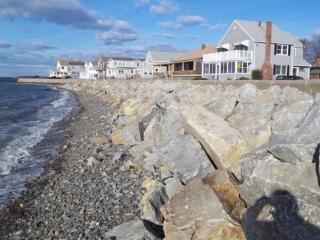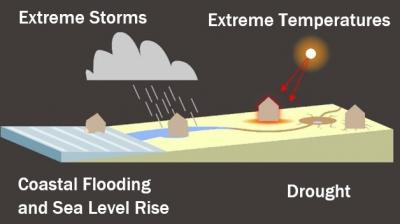Municipal Vulnerability Preparedness

Find the Weymouth's MVP Report here.
In June 2017, the Town secured a $25,000 grant through the Executive Office of Energy and Environmental Affair's Municipality Vulnerability Preparedness (MVP) Grant and Designation Program to begin the process of planning for climate change. Weymouth was among 71 communities to receive a MVP Planning Grant in the first round of funding, representing 20% of the state’s municipalities.
Through the MVP Program, the Town and its partners completed a comprehensive vulnerability assessment and Community Resilience Building (CRB) workshop, which identified key climate-related hazards, vulnerabilities, and strengths, and prioritized specific actions for reducing the Town's risks and building resilience to climate change. All climate-change scenarios were based on projections generated by the Northeast Climate Science Center at UMass-Amherst and are available to the public through the resilient MA Climate Change Clearinghouse.
The Town’s MVP planning process was coordinated by Planning and Conservation staff in collaboration with the Town's emergency management team, engineers and public works staff, Waterfront Committee, Conservation Commission, harbormaster, and local civic groups and watershed associations. Stantec’s Urban Places Group of Boston provided technical assistance as the Town’s MVP-certified consultant.
Weymouth's MVP report will be used to update and inform the Town’s local planning documents, public works projects, and future grant applications.
Municipal Vulnerability Preparedness
 In September 2016, Governor Baker signed Executive Order 569, directing multiple state agencies to develop and implement a statewide comprehensive climate adaptation plan with the best climate-change data available. Recognizing that many adaptation solutions are local in nature, a key commitment of Executive Order 569 is to assist local governments in completing their own assessments and resiliency plans. The MVP Grant and Designation Program represents the first step in fulfilling this commitment.
In September 2016, Governor Baker signed Executive Order 569, directing multiple state agencies to develop and implement a statewide comprehensive climate adaptation plan with the best climate-change data available. Recognizing that many adaptation solutions are local in nature, a key commitment of Executive Order 569 is to assist local governments in completing their own assessments and resiliency plans. The MVP Grant and Designation Program represents the first step in fulfilling this commitment.
The MVP program provides planning grants to municipalities to complete vulnerability assessments and develop action-oriented resiliency plans. Funding is used by cities and towns to hire a MVP-certified consultant who is trained to provide technical assistance and complete a community's vulnerability assessment and resiliency plan using the Community Resilience Building Framework. Towns and cities are free to choose the consultant of their choice from a list of certified MVP providers.
Communities that complete the MVP planning process become certified "MVP Communities" and are eligible for Action Grant funding and other opportunities through the Commonwealth.
Massachusetts Climate Change Clearinghouse
The resilient MA Climate Change Clearinghouse is an online gateway for policymakers, local planners, and the public to identify and access climate data, maps, websites, tools, and documents relevant to climate change adaptation and mitigation across Massachusetts. The goal of this website is to support scientifically sound and cost-effective decision making and to enable users to plan and prepare for climate change impacts. The site catalogs specific vulnerabilities, risks and strategies concerning agriculture, forestry, local government, education, energy, recreation, and transportation. All of the climate projections included on the website are specific to Massachusetts and were produced by the Northeast Climate Science Center at UMass-Amherst. The site also includes an interactive map so users can understand how climate change will affect specific locations in Massachusetts.
Community Resilience Building Framework
The Community Resilience Building (CRB) Framework is a friendly "anywhere at any scale" process for developing action-oriented plans to help communities adapt to extreme weather and natural and climate-related hazards. The CRB Framework has been tried and tested, and is rooted in extensive experience working with communities by The Nature Conservancy, NOAA's Office for Coastal Management, and countless partners. It employs a community-driven process, infused with information, experience, and dialogue, where participants identify top hazards, current challenges and strengths, and then develop and prioritize actions to improve their community's resilience.
The core directive of the CRB Framework is to foster collaboration with and among community stakeholders that will advance the education, planning, and ultimately implementation of priority actions. This directive is achieved through a facilitated workshop approach, centered on a carefully crafted Risk Matrix, which captures and organizes community dialogue and helps to generate the momentum needed to advance a community's resiliency plan.
Weymouth's CRB workshop was completed in Feburary 2018. Results of this workshop were presented during a community listening session in June 2018.
Related Documents/Links
- Final MVP Planning Report (Stantec, Jun 2018)
- Video: Community Listening Session (WETC, Jun 2018)
- Presentation: Community Listening Session (Stantec, Jun 2018)
- Video: Development Update - Municipal Vulnerability Preparedness (WETC)
- Draft MVP Planning Report (Stantec, Apr 2018)
- Draft Community Resilience Building Matrix (Stantec, Apr 2018)
- Video: Community Resilience Building Workshop (WETC, Feb 2018)
- Presentation: Community Resilience Building Workshop (Stantec, Feb 2018)
- Presentation: MVP Kick-Off (Stantec, Dec 2017)
- Community Resilience Building Workshop Guide (The Nature Conservatory, Dec 2017)
- Resilient MA Climate Change Clearinghouse (EOEEA)
- Statewide Climate Projections Summary (EOEEA, 2017)
Statewide and Major Basin Climate Projections Summary (EOEEA, 2017)

